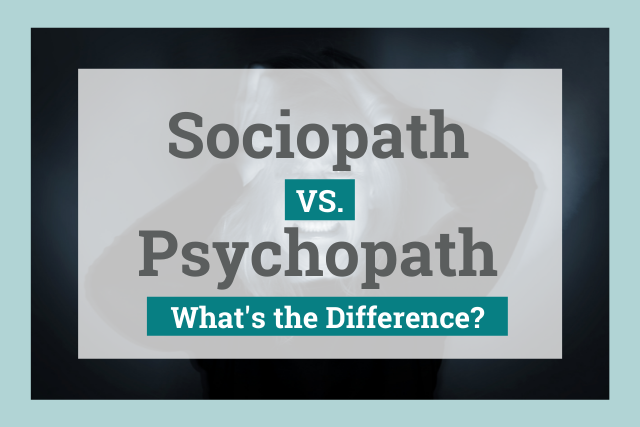
Sociopath and psychopath are words that many people use interchangeably. But there are some key differences between these words!
Whether you’re writing a crime thriller or just interested in psychology, it’s important to know the distinctions between sociopath vs. psychopath.
What Is Antisocial Personality Disorder?
Antisocial personality disorder is the clinical diagnosis given to both sociopaths and psychopaths. It is a mental disorder, and it is one of ten personality disorders recognized by the Diagnostic and Statistical Manual of Mental Disorders, Fifth Edition or DSM-V.
Antisocial personality disorder, often abbreviated to ASPD, is a cluster B personality disorder. These types of personality disorders present as dramatic, erratic, overly emotional, and unpredictable.
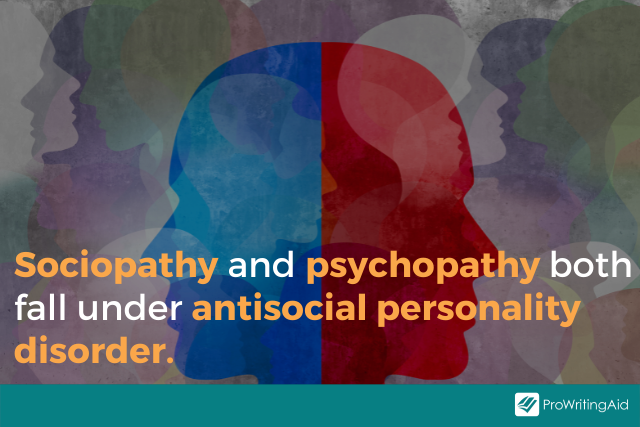
A person with ASPD shows a persistent disregard for others. In the United States, the clinical criteria for diagnosis from the DSM-V is detailed. A person must first meet the criteria for a personality disorder, then the clinician must rule out the other personality disorders.
Below is a list of signs and symptoms of ASPD that we’ve compiled from the DSM-V and Merck Manual:
- large ego and a self-esteem derived from power
- lack of empathy and disregard for others’ feelings, needs, and wants
- lack of remorse when their actions harm others
- difficulty with personal relationships because exploitation is how they relate to others
- manipulative, deceitful, callous, and hostile
- irresponsible and impulsive, takes unnecessary risks
- demonstrates aggressive or aggravated behavior
A licensed clinician must diagnose ASPD. A personality cannot change, but various treatments can help a person with ASPD function in society.
Are Sociopath and Psychopath Outdated Terms?
Sociopath and psychopath are not clinical diagnoses. Both of these terms fall under the umbrella of ASPD. However, these terms are not completely outdated. There are differences between sociopathy and psychopathy.
But as they are both part of the same disorder, it’s important to understand that the media has sensationalized the terms. Often, the terms are thrown out for people who actually exhibit other personality disorders like borderline personality or narcissistic personality, or they are used for people who have mood disorders or other mental illnesses.
As writers, it’s important to understand the distinction between a sociopath and psychopath if you’re writing about them in your books. If you have an expert in your crime novel, for instance, they will need to use the terms correctly.
It’s also important to understand the differences between sociopaths and psychopaths when creating your characters’ backstories. They will have different experiences depending on how they are classified.
We also want to be sensitive and accurate when dealing with any mental or personality disorder. Just because you have a character who commits a crime, it doesn’t mean they have antisocial personality disorder. If your character struggles with mental illness like post-traumatic stress, schizophrenia, bipolar disorder, or depression, you don’t want to refer to them as psychopaths or sociopaths. It would be insensitive and ableist.
When writing any sort of mental health issue in your books, it’s always a good idea to find an expert reader and/or a sensitivity reader.
Accuracy is important when dealing with any sort of mental disorder. The differences between sociopath vs. psychopath are nuanced, so let’s dive into them.
What Is the Difference Between a Psychopath and a Sociopath?
Both psychopaths and sociopaths have a disregard for others and for the rules and norms of society. They both struggle with forming attachments to others, and both can have violent tendencies. It’s important to note that not all violent criminals are psychopaths or sociopaths. Likewise, not all people with ASPD exhibit criminal behavior.
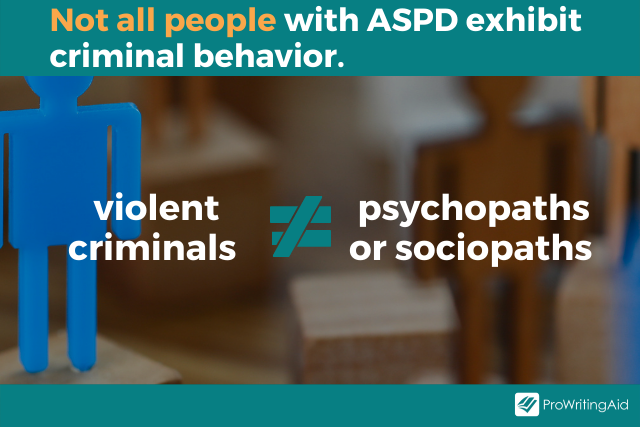
Let’s look at each type of antisocial personality to understand the differences between them.
What Is a Sociopath?
A sociopath is typically easier to identify than a psychopath, even for psychiatry experts.
A sociopath has more erratic behavior than a psychopath, according to the DSM-V and other sources like Psych Central and Merck Manual. It’s easy to rattle a sociopath because they are quick to agitate. They’re the definition of hot-headed, but their explosive behavior doesn’t come with any remorse.
Because of their explosive nature, sociopaths have a much harder time fitting into society. They are often in and out of relationships and go from job to job. While it’s usually their behavior that causes them instability, they don’t acknowledge when something is their fault.
Sociopaths are very likely to have financial problems because they can’t hold down a job or they make impulsive and risky financial decisions.
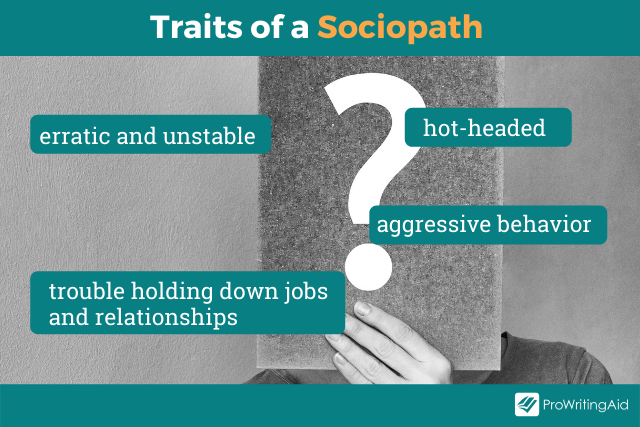
A sociopath can form emotional attachments to others, but because of their volatile and manipulative tendencies, these relationships don’t often last long.
Can a sociopath feel remorse? Not in the way a someone without this personality disorder would. They might recognize that their behaviors are technically wrong. However, in their mind, it doesn’t matter because they believe their actions are always justified.
When a sociopath commits a violent crime, like murder, it’s usually done without much premeditation in the heat of the moment. This makes their crimes sloppy and uncalculated.
A sociopath is often viewed by others as dangerous or disturbed, so they don’t blend in well, which is very different from a psychopath.
What Is a Psychopath?
According to Dr. Kristen Fuller at Psychology Today, a psychopath blends in very well. They are very good at appearing to care and pretending to fit into society’s norms. This is what makes them so hard to identify and diagnose.
When a psychopath is not trying to fit in, they appear cold-blooded and unfeeling. A psychopath has zero regard for anyone besides themselves. However, they are very good at pretending to care for others.
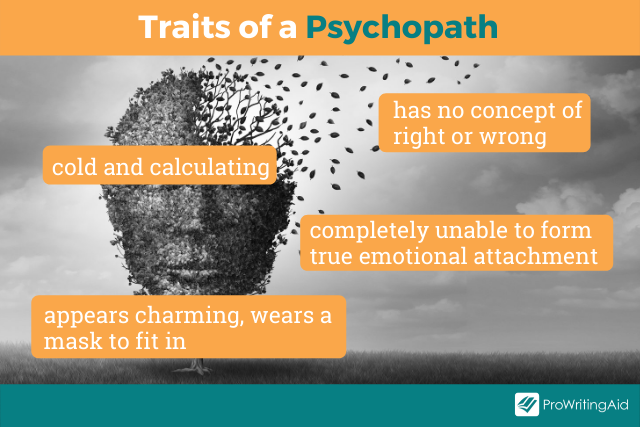
A psychopath might dote on someone and make them feel loved, but their intent is to manipulate them or use them in some way. They might use them as a way to cover up their psychopathic tendencies, or they might exploit them in some way. They are, however, unable to form genuine emotional attachments.
Because psychopaths are so successful at manipulating others, it’s hard to tell when you’ve been targeted by one. They excel at wearing a mask because they are so calculating. They are often charming.
They are also often successful in their chosen field because they have no qualms about using others or hurting others for personal gain. They have a very inflated sense of self that they derive from the power they achieve.
When psychopaths commit violent crimes, they are deliberate and intricately planned. They try their hardest to cover their tracks, and they plan for anything that might derail them. Many serial killers, such as Ted Bundy and BTK, were psychopaths, which allowed them to avoid detection for a long time.
Psychopaths cannot feel any sort of remorse. They do not understand the difference between right and wrong at all.
How Can You Tell the Difference Between a Psychopath and a Sociopath?
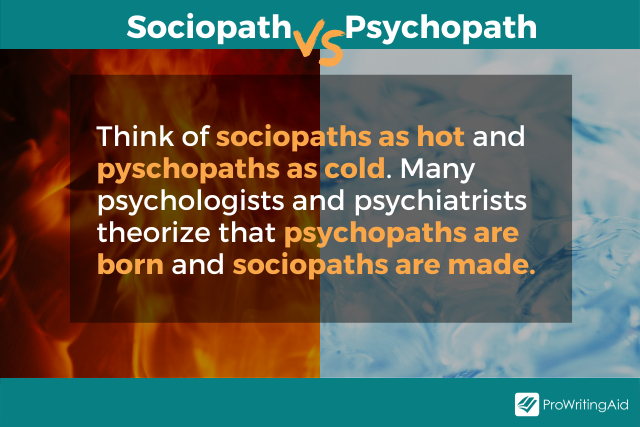
If your character has ASPD, whether they are more of a sociopath or a psychopath will affect their interactions with the world:
- A sociopath will appear more volatile and erratic
- A psychopath will appear either cold or perfectly normal
Sociopaths show their hands more easily than a psychopath. Even if you aren’t sure if someone has ASPD, you’ll likely know that something is wrong. On the other hand, you might know a psychopath for their whole life and never have any inkling.
It takes an expert to diagnose a psychopath because a psychopath is able to manipulate their answers to appear fine. Some psychopaths have opened up in interviews after being caught for crimes because they no longer have a reason to pretend to be normal.
One of the big differences might lie in a person’s childhood. While there isn’t hard evidence, many psychologists and psychiatrists theorize that psychopaths are born and sociopaths are made. In other words, sociopathy might form after a particularly traumatic childhood, whereas psychopathy might be in a person’s genes.
Think of psychopaths as cold and sociopaths as hot to tell the difference between them.
What Disorders Are Confused With Sociopathy and Psychopathy?
Not all sociopaths and psychopaths become criminals or commit violence. Likewise, some violent criminals might have no mental health issues or other mental health issues. Please remember that a mental health diagnosis does not mean a person will become a criminal.
Other personality disorders that people mistake for antisocial personality disorder include narcissistic personality and borderline personality. According to the DSM-V, narcissistic personality disorder can also present as egocentrism, manipulation, and a lack of empathy. However, it actually hides a very fragile self-esteem.
Borderline personality disorder might look like sociopathy on the surface because they can be unstable and quick to anger. Unlike sociopathy, however, they have an intense fear of abandonment and little to no self-esteem, according to current diagnostic criteria.
Should I Write About Sociopaths and Psychopaths?
Sociopaths and psychopaths exist, and they can make for interesting characters. It’s crucial to do extensive research on any sort of health or mental health issue before writing about it, and antisocial personality disorder is no different.
Sociopath and psychopath are words that film, TV, and books have made part of our vernacular and are often sensationalized, but that portrayal isn’t always accurate. Without proper understanding, you can end up unintentionally hurting readers with mental illness.
Words like “crazy” and “nuts” are often called out for being ableist. Calling a character who acts erratically out of fear or mental instability a “psychopath” is harmful to people who may experience violent outbursts or psychosis due to trauma, schizophrenia, or other diagnoses.
If you’re writing any sort of character with a personality disorder, please consider hiring a sensitivity or expert reader. As writers, we know that words are powerful. Sensitivity readers can help reduce unintentional harm.
ProWritingAid can’t replace a real sensitivity reader, but it can help flag potentially harmful terms in your writing.
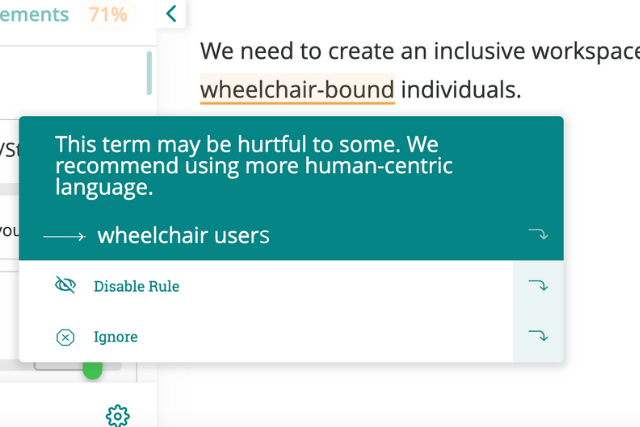
Our inclusive language suggestions will automatically offer alternatives for outdated terminology which you can choose to ignore or accept.
Try ProWritingAid with a free account to help improve the inclusivity of your writing.
What Are Some Examples of Psychopaths and Sociopaths in Literature?

American Psycho by Bret Easton Ellis is all about a psychopath, and the portrayal is fairly accurate. Patrick Bateman is a charming, successful businessman. He manages to hide his violent secret life well. As the book progresses, however, he begins to lose control and his violent urges become increasingly disturbing.
Alex from Anthony Burgess’s A Clockwork Orange is a sociopath. His violence is random, reckless, and extensively gruesome. He’s not shy about what he does or who sees him. The government attempts to cure him with a procedure. Thinking he’s cured of his violent tendencies, he has to deal with the consequences from all his brutality, which drives him to attempt suicide. The book ends with him uncured but considering giving up his sociopathic tendencies to become a productive member of society.
One Flew Over the Cuckoo’s Nest by Ken Kesey takes place in a mental hospital. The protagonist Randle Patrick McMurphy pretends to be insane to avoid a prison sentence. His behavior appears more like the current definition of sociopath, with a degree of recklessness in his actions. However, the end of the novel reveals he does not fit the criteria of antisocial personality disorder. He sacrifices himself to stop Nurse Ratched from tormenting any more patients.
Nurse Ratched, however, is a textbook psychopath—if the textbook is the DSM-V. She is cold and manipulative, and she abuses her power to control the lives of her patients. She’s not erratically violent, instead preferring humiliation, medication, or medical procedures to exert control. She keeps order in the mental hospital, so her superiors don’t question her methods, allowing her to get away with torturing patients for years.
Use The Terms With Care
Terms relating to mental health are thrown around a lot. Make sure write responsibly: use them accurately, and with good intent.


